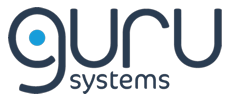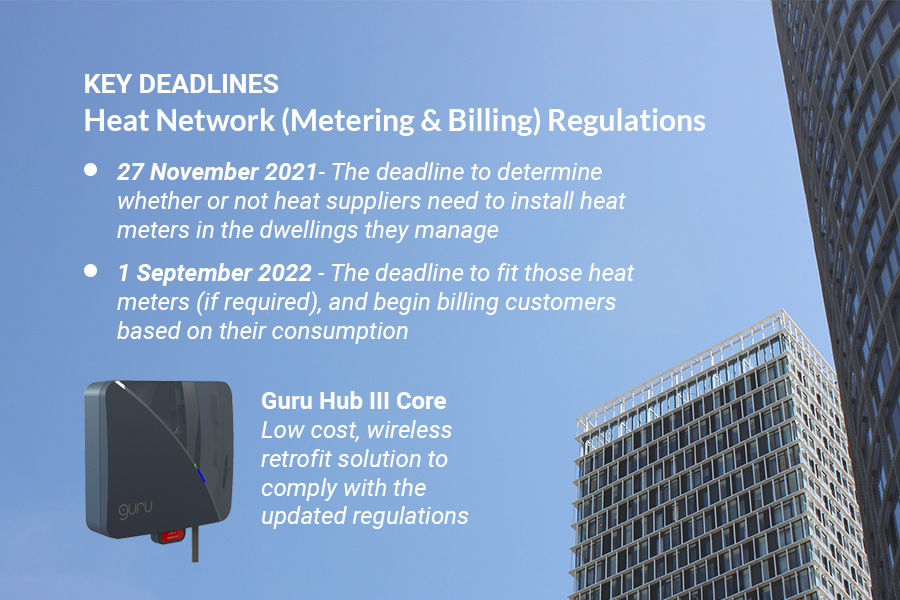At the end of 2020, the Heat Networks (Metering and Billing) Regulations were updated. Included in the changes are two main deadlines:
- 27 November 2021 – The deadline to determine whether or not heat suppliers need to install heat meters in the dwellings they manage
- 1 September 2022 – The deadline to fit those heat meters (if required), and begin billing customers based on their consumption
(For those not familiar with changes, there’s a short summary at the end of this post.)
These deadlines are driving procurement decisions on heat networks.
While some heat suppliers will be considering installing in-home displays in their properties to facilitate pay-as-you-go billing (like the Guru Hub 2), many are looking for low-cost hardware which captures the data required by the Regulations and supports credit billing only.
Developing Guru Hub 3 Core with heat suppliers
Guru Systems has spent two years working with our clients to develop Guru Hub 3 Core, our first screen-free automatic meter reader. It manages and monitors up to four utility accounts, and controls up to two external control devices, such as shut-off valves. The utility meter data captured by the Guru Hub 3Core is then structured and accessed online or via FTP, ready to be used for credit billing.
The Guru Hub 3 Core is price-competitive with wired M-Bus, and it works using Guru’s wireless mesh network, meaning no site-wide M-Bus cabling is required.
It’s already been installed on a variety of sites across the UK, and, crucially, the Guru Hub 3 Core enables heat suppliers to comply with the updated Regulations.
Why wireless mesh technology is the best solution for retrofit projects
Running cables to occupied dwellings is expensive and extremely disruptive for residents. Guru Hub 3 Core is not only more reliable than wired M-Bus, but requires less time on site to install.
Guru Hub 3 Core is price competitive with wired M-Bus in new builds, so when the cost of retrofitting properties is considered, savings are even greater.
Comparison: Guru Hub III Core vs Wired M-Bus
| Guru Hub 3 Core | Wired M-Bus | |
|---|---|---|
| Price |
|
Requires site-wide M-Bus cabling and datalogger(s) at an estimated £175 – £275 per dwelling in new build. Costs in retrofit are significantly higher. |
| Data reliability | Guru Hubs use 868 MHz wireless mesh communications to ensure high reliability, including in areas where SIM cards won’t work due to lack of signal. | Wired M-Bus, which can be prone to communications faults due to broken wires or shorting, as well as ADSL to the site. |
| Data frequency | Guru Hubs captures meter data every five minutes for network performance management, or every thirty minutes for metering and billing purposes. | The frequency of data that can be collected via wired M-Bus varies according to the datalogger and number of meters. |
| GDPR and data security (Meter data is considered ‘Personal Data’ under GDPR) | Guru’s wireless mesh network encrypts customer data. Our system is covered under Guru’s ISO27001 certification for information security. | Wired M-Bus is not encrypted and can be read from anywhere on the M-Bus network. |
| Retrofitting heat meters to comply with the Heat Networks (Metering and Billing) Regulations by Sep 2022 | Guru Hub 3 Core supports hassle free compliance as no wires means minimal resident interruption. | Running cables to occupied dwellings is expensive and extremely disruptive for residents. |
Take the opportunity to capture heat network performance data while retrofitting heat meters
Given new hardware may have to be installed in residents’ homes in order to comply with the Regulations, now is a good opportunity to start capturing heat network performance data.
As well as capturing metering and billing data for credit billing, Guru Hub 3 Core also captures data every five minutes for network performance management via Guru Pinpoint. This means that with one device, heat suppliers can bill their residents based on their consumption, and see heat network performance data.
Find out more about how Guru Pinpoint helps to cut costs and carbon in our blog about a BEIS-funded project which used heat network data captured by Guru Systems to drive efficiency improvements: Using Guru Pinpoint to identify inefficiencies on nine existing heat networks
Get in touch
For more information about installing Guru Hub 3 Core ahead of the September 2022 deadline (or in new developments), get in touch with our sales team.
In detail: The updated Heat Networks (Metering and Billing) Regulations
The Heat Networks (Metering and Billing) Regulations came into force in 2014, and among other requirements, they include a requirement for heat suppliers to fit heat meters (where it is cost-effective and technically feasible), and then to bill customers based on the amount of heat they consume.
In 2020 the assessment tool used to decide whether it was cost-effective and technically feasible to install meters was updated, and new ‘building classes’ were introduced – these explain which types of buildings need to install meters.
The three building classes are:
- Viable – meters must be installed
- Open – meters must be installed if the result of a cost-effectiveness assessment is positive
- Exempt – meters do not have to be installed
Key dates
- For buildings that fall into the open class before 27 November 2021, heat suppliers must complete the cost-effectiveness assessment in respect of (heat) meters by 27 November 2021. If the cost-effectiveness assessment results are positive, they must install meters before 1 September 2022.
- Where a building first falls into the open class between 27 November 2021 and 1 September 2022, the cost-effectiveness assessment must be made for that building and the installation be complete before 1 September 2022.
In short, by November 2021 existing heat suppliers must complete the initial assessments to determine building classification (viable, open or exempt), and the type of metering devices that must be installed throughout their building portfolios. Then, within the remaining nine months leading up to September 2022, properties must have metering devices installed, along with remote meter reading systems to facilitate individual billing of residents.
For more information, visit guidance from the Department for Business, Energy & Industrial Strategy and Office for Product Safety and Standards or read the associated guidance document here.

